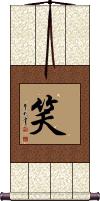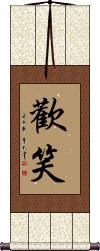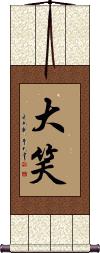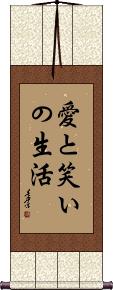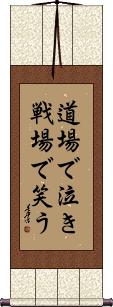Many custom options...
And formats...

笑 in Chinese / Japanese...
Buy an 笑 calligraphy wall scroll here!
Personalize your custom “笑” project by clicking the button next to your favorite “笑” title below...
3. Roar of Laughter / Big Laughs
4. Holding Flowers with Subtle Smile
5. The Whole Room Rocks With Laughter
9. The one who retreats 50 paces mocks the one to retreats 100
10. Live Laugh Love
Laugh / Smile
笑 simply means to laugh or smile.
Notes: In some contexts, it can mean “ridicule” in Korean Hanja. 笑 is not often seen alone in Japanese, though it is understood.
Happy Laughter
Roar of Laughter / Big Laughs
大笑 can be translated as “roar of laughter,” “loud laughter,” “hearty laugh,” or “cachinnation.”
The first character means big or great, and the second means to laugh or smile.
If you like humor, this is a great wall scroll to hang in your home.
Holding Flowers with Subtle Smile
An idiom for heart-to-heart communication
拈華微笑 is a Chinese, Korean, and Japanese Buddhist title that relays the idea of “heart-to-heart communication,” or “thought transference.”
The literal translation is, “holding a flower and subtly smiling,” or “the holding of a flower with a subtle smile.” It is the visual act and emotion that communicates more volume than words can say.
The Whole Room Rocks With Laughter
The perfect scroll if you love humor or as a gift for the comedian in your life
In China, 哄堂大笑 is a proverb that is used in response to a good joke or witty comment.
The story goes that Mr. Feng and Mr. He were both senior officials in the Song Dynasty (about a thousand years ago). One day, Mr. Feng walked into their shared office wearing a new pair of boots. The boots caught the eye of Mr. He who said, “New boots! - how much were they?.” Mr. Feng lifted one of the boots off the ground as if to show it off and responded, “900 coins.”
Astonished, Mr. Feng explained, “900? How can that be? - I paid 1800 coins for my boots!.” Mr. Feng then lifted his other foot off the ground and said, “This boot was also 900 coins.”
It is said that the whole room was shaking from the laughter of all that heard Mr. Feng's joke on Mr. He.
Laughing Dragon Kung Fu
笑龍功夫 is the title for a Martial Arts studio (custom-made at by request of the owner of the studio).
Live Laugh Love
In English, the word order shown in the title is the most natural or popular. In Chinese, the natural order is a little different:
The first character means laugh (sometimes means smile).
The second character means love.
The last two characters mean “live” as in “to be alive” or “pursue life.”
Please note: 笑愛生活 is not a normal phrase in that it does not have a subject, verb, or object. It is a word list. Word lists are not common in Asian languages/grammar (at least not as normal as in English). We only added this entry because so many people requested it.
We put the characters in the order shown above, as it almost makes a single word with the meaning “A life of laughter and love.” It's a made-up word, but it sounds good in Chinese.
We removed the Japanese pronunciation guide from this entry, as the professional Japanese translator deemed it "near nonsense" from a Japanese perspective. Choose this only if your audience is Chinese and you want the fewest-possible characters to express this idea.
In Korean, this would be 소애생활 or "so ae saeng hwar" but I have not confirmed that this makes sense in Korean.
Sense of Humor
Funny Bone
The one who retreats 50 paces mocks the one to retreats 100
The pot calls the kettle black
五十步笑百步 is a Chinese proverb that means the one who retreats 50 paces mocks the one who retreats 100 paces.
During the Warring States Period of what is now China (475 - 221 B.C.), the King of Wei was in love with war. He often fought with other kingdoms just for spite or fun.
One day, the King of Wei asked the philosopher Mencius, “I love my people, and all say I do the best for them. I move the people from famine-stricken areas to places of plenty and transport grains from rich areas to the poor. Nobody goes hungry in my kingdom, and I treat my people far better than other kings. But why does the population of my kingdom not increase, and why does the population of other kingdoms not decrease?”
Mencius answered, “Since you love war, I will make this example: When going to war, and the drums beat to start the attack, some soldiers flee for their lives in fear. Some run 100 paces in retreat, and others run 50 steps. Then the ones who retreated 50 paces laugh and taunt those who retreated 100 paces, calling them cowards mortally afraid of death. Do you think this is reasonable?
The King of Wei answered, “Of course not! Those who run 50 paces are just as timid as those who run 100 paces.”
Mencius then said, “You are a king who treats his subjects better than other kings treat their people, but you are so fond of war that your people suffer from great losses in battle. Therefore, your population does not grow. While other kings allow their people to starve to death, you send your people to die in war. Is there any difference?”
This famous conversation led to the six-character proverb shown here. It serves as a warning to avoid hypocrisy. It goes hand-in-hand with the western phrase, “The pot calls the kettle black,” or the Biblical phrase, “Before trying to remove a splinter from your neighbor's eye, first remove the plank from your own eye.”
Live Laugh Love
Because a word list of “Live Laugh Love” is not natural in Japanese, this takes the concept and incorporates it into a proper phrase.
愛と笑いの生活 can be translated as “A life of love and laughter” or “Live life with love and laughter.”
Note: Because this selection contains some special Japanese Hiragana characters, it should be written by a Japanese calligrapher.
Cry in the Dojo - Laugh on the Battlefield
道場で泣き戦場で笑う is a Japanese phrase that means “Cry in the dojo, laugh on the battlefield.”
You'll see this phrase in a lot of dojos as a kind of philosophical joke.
Note: Because this selection contains some special Japanese Hiragana characters, it should be written by a Japanese calligrapher.
Not the results for 笑 that you were looking for?
Below are some entries from our dictionary that may match your 笑 search...
| Characters If shown, 2nd row is Simp. Chinese |
Pronunciation Romanization |
Simple Dictionary Definition |
笑 see styles |
xiào xiao4 hsiao warau わらう |
More info & calligraphy: Laugh / Smile(abbreviation) (slang) LOL; haha; (female given name) Warau to laugh |
大笑 see styles |
dà xiào da4 xiao4 ta hsiao taishou / taisho たいしょう |
More info & calligraphy: Roar of Laughter / Big Laughs(n,vs,vi) loud laughter; hearty laugh |
歡笑 欢笑 see styles |
huān xiào huan1 xiao4 huan hsiao |
More info & calligraphy: Happy Laughter |
哄堂大笑 see styles |
hōng táng dà xiào hong1 tang2 da4 xiao4 hung t`ang ta hsiao hung tang ta hsiao |
More info & calligraphy: The Whole Room Rocks With Laughter |
拈華微笑 拈华微笑 see styles |
niān huá wéi xiào nian1 hua2 wei2 xiao4 nien hua wei hsiao nengemishou / nengemisho ねんげみしょう |
More info & calligraphy: Holding Flowers with Subtle Smilethe holding of a flower and the subtle smile |
笑いの壺 see styles |
warainotsubo わらいのつぼ |
More info & calligraphy: Sense of Humor |
五十步笑百步 see styles |
wǔ shí bù xiào bǎi bù wu3 shi2 bu4 xiao4 bai3 bu4 wu shih pu hsiao pai pu |
More info & calligraphy: The one who retreats 50 paces mocks the one to retreats 100 |
咲 笑 see styles |
xiào xiao4 hsiao momoka ももか |
old variant of 笑[xiao4] (female given name) Momoka |
一笑 see styles |
isshou / issho いっしょう |
(noun/participle) laugh; smile; (female given name) Hitoe |
七笑 see styles |
nanae ななえ |
(female given name) Nanae |
万笑 see styles |
maemi まえみ |
(female given name) Maemi |
三笑 see styles |
sanshou / sansho さんしょう |
(personal name) Sanshou |
乃笑 see styles |
noe のえ |
(female given name) Noe |
乾笑 干笑 see styles |
gān xiào gan1 xiao4 kan hsiao |
to give a hollow laugh; to force a smile; forced laugh; CL:聲|声[sheng1] |
佳笑 see styles |
kae かえ |
(female given name) Kae |
侃笑 see styles |
naoe なおえ |
(female given name) Naoe |
保笑 see styles |
hoemi ほえみ |
(female given name) Hoemi |
倖笑 see styles |
yukie ゆきえ |
(female given name) Yukie |
偲笑 see styles |
shie しえ |
(female given name) Shie |
偷笑 see styles |
tōu xiào tou1 xiao4 t`ou hsiao tou hsiao |
to laugh up one's sleeve |
傻笑 see styles |
shǎ xiào sha3 xiao4 sha hsiao |
to giggle; to laugh foolishly; to smirk; to simper |
優笑 see styles |
yue ゆえ |
(female given name) Yue |
充笑 see styles |
mie みえ |
(female given name) Mie |
光笑 see styles |
hikae ひかえ |
(female given name) Hikae |
八笑 see styles |
hasshou / hassho はっしょう |
(personal name) Hasshou |
共笑 see styles |
tomoe ともえ |
(female given name) Tomoe |
其笑 see styles |
kishou / kisho きしょう |
(personal name) Kishou |
冴笑 see styles |
saemi さえみ |
(female given name) Saemi |
冷笑 see styles |
lěng xiào leng3 xiao4 leng hsiao reishou / resho れいしょう |
to sneer; to laugh grimly; grin of dissatisfaction (bitterness, helplessness, indignation etc); bitter, grim, sarcastic or angry smile (noun, transitive verb) sneer; derision; scornful laugh; cold smile |
凜笑 see styles |
rie りえ |
(female given name) Rie |
Click here for more 笑 results from our dictionary
The following table may be helpful for those studying Chinese or Japanese...
| Title | Characters | Romaji (Romanized Japanese) | Various forms of Romanized Chinese | |
| Laugh Smile | 笑 | e / shou / wa e / sho / wa | xiào / xiao4 / xiao | hsiao |
| Happy Laughter | 歡笑 欢笑 | huān xiào huan1 xiao4 huan xiao huanxiao | huan hsiao huanhsiao |
|
| Roar of Laughter Big Laughs | 大笑 | taishou / taisho | dà xiào / da4 xiao4 / da xiao / daxiao | ta hsiao / tahsiao |
| Holding Flowers with Subtle Smile | 拈華微笑 拈华微笑 | nenge misho nengemisho | niān huá wēi xiào nian1 hua2 wei1 xiao4 nian hua wei xiao nianhuaweixiao | nien hua wei hsiao nienhuaweihsiao |
| The Whole Room Rocks With Laughter | 哄堂大笑 | hōng tāng dà xiào hong1 tang1 da4 xiao4 hong tang da xiao hongtangdaxiao | hung t`ang ta hsiao hungtangtahsiao hung tang ta hsiao |
|
| Laughing Dragon Kung Fu | 笑龍功夫 笑龙功夫 | xiào lóng gōng fu xiao4 long2 gong1 fu xiao long gong fu xiaolonggongfu | hsiao lung kung fu hsiaolungkungfu |
|
| Live Laugh Love | 笑愛生活 笑爱生活 | xiào ài shēng huó xiao4 ai4 sheng1 huo2 xiao ai sheng huo xiaoaishenghuo | hsiao ai sheng huo hsiaoaishenghuo |
|
| Sense of Humor | 笑いの壺 | warainotsubo | ||
| The one who retreats 50 paces mocks the one to retreats 100 | 五十步笑百步 | wù shí bù xiào bǎi bù wu4 shi2 bu4 xiao4 bai3 bu4 wu shi bu xiao bai bu wushibuxiaobaibu | wu shih pu hsiao pai pu wushihpuhsiaopaipu |
|
| Live Laugh Love | 愛と笑いの生活 | ai to warai no seikatsu aitowarainoseikatsu | ||
| Cry in the Dojo - Laugh on the Battlefield | 道場で泣き戦場で笑う | doujou de naki senjou de warau dojo de naki senjo de warau | ||
| In some entries above you will see that characters have different versions above and below a line. In these cases, the characters above the line are Traditional Chinese, while the ones below are Simplified Chinese. | ||||
Successful Chinese Character and Japanese Kanji calligraphy searches within the last few hours...
